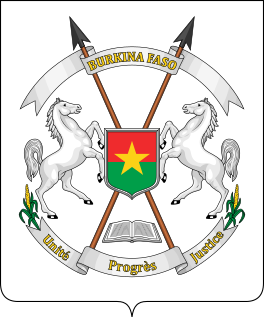
French West Africa was a federation of eight French colonial territories in Africa: Mauritania, Senegal, French Sudan, French Guinea, Ivory Coast, Upper Volta, Dahomey and Niger. The capital of the federation was Dakar. The federation existed from 1895 until 1960.
This electoral calendar 2007 lists the national/federal direct elections held in 2007 in the de jure and de facto sovereign states and their dependent territories. Referendums are included, although they are not elections. By-elections are not included.

The National Assembly is the legislative house of Parliament of Mauritania. The legislature has 157 members, elected for five-year terms in single or two-seats constituencies. From 1961 until 1978, the only legal party in the country was the Mauritanian People's Party. The legislature was disbanded after the 10 July 1978 coup. In 1992, a bicameral legislature was established, consisting the National Assembly and Senate of Mauritania. In the 1990s, a multiparty system was introduced in Mauritania. However, the Democratic and Social Republican Party dominated the parliament until a coup in 2005. The first truly democratic elections were held in 2006.

The Mauritanian Parliament (Barlamane/Parlement) is composed of a single chamber:

The current Constitution of Mauritania was adopted on 12 July 1991. There have been several constitutions since Mauritania's independence in 1960.

The period from the mid-nineteenth to mid-twentieth centuries is the colonial period in Mauritania.

Elections for the Territorial Assembly were held in French Dahomey on 30 March 1952. Sourou-Migan Apithy's Republican Party of Dahomey won 19 of the 32 second college seats. Only ten members of the Legislative Council elected in 1947 were re-elected.

Parliamentary elections were held in Mauritania on 17 May 1959. The result was a victory for the Mauritanian Regroupment Party, which was the only party to contest the elections, thereby winning all 40 seats in the National Assembly. Voter turnout was 90.3%.

Presidential elections were held for the first time in Mauritania in August 1961 to elect the President for the next five years. Moktar Ould Daddah, who had been acting head of state since independence from France in 1960 was the only candidate, and was elected unopposed. Although he was a member of the ruling Mauritanian Regroupment Party, his candidacy was also supported by the Mauritanian National Union. Voter turnout was 93.6%.

General elections were held in Mauritania on 8 August 1971 to elect a President and National Assembly, the first time the two elections had been held together. At the time, the country was a one-party state with the Mauritanian People's Party (PPM) as the sole legal party. Its leader, incumbent President Moktar Ould Daddah, was the only candidate in the presidential election, and was re-elected unopposed to a third term in office, whilst the PPM won all 50 seats in the National Assembly election. Voter turnout for the parliamentary election was reported to be 95.6%.

General elections were held in Mauritania on 8 August 1976 to elect a President and National Assembly. At the time, the country was a one-party state with the Mauritanian People's Party (PPM) as the sole legal party. Its leader, incumbent President Moktar Ould Daddah, was the only candidate in the presidential election, and was re-elected unopposed, whilst the PPM won all the seats in the National Assembly election. Voter turnout was 97.9%. They were the last elections held until the restoration of multi-party democracy in 1992.

Elections to the French National Assembly were held in Mauritania on 10 November 1946. Previously Mauritania had elected MPs in a single joint constituency with neighbouring Senegal, but the new 1946 constitution had separated the two territories politically, giving Mauritania one seat in the Assembly. The result was a victory for Horma Ould Babana, a member of the French Section of the Workers' International. His opponents were Yvon Razac, a member of the MRP and the candidate favored by the French government and traditional Moorish leaders, and Souleymane Diop, an independent.

Elections to the French National Assembly were held in Mauritania on 17 June 1951. Mauritania had one seat in the Assembly, which was won by Sidi el-Mokhtar N'Diaye, a member of the Mauritanian Progressive Union. He defeated the incumbent, Horma Ould Babana, who had been elected as a member of the French Section of the Workers' International in the last election, but had since gone on to leave the SFIO and form his own party, the Mauritanian Entente.

Territorial Assembly elections were held in Mauritania on 31 March 1957. The result was a victory for the Mauritanian Progressive Union, which won 33 of the 34 seats. The other seat was won by an independent candidate in the Baie du Levrier constituency.

Territorial Assembly elections were held in French Upper Volta on 30 May 1948, with a second round on 20 June. They were the first elections to the new Territorial Assembly, which had been created following the separation of Upper Volta from Ivory Coast the previous year.

Territorial Assembly elections were held in French Upper Volta on 30 March 1948. The result was a victory for the Voltaic Union (UV).

Territorial Assembly elections were held in Chad on 30 March 1952. The result was a victory for Gaullist parties, with the Rally of the French People winning all 15 seats in the First College and the Chadian Democratic Union winning 24 of the 30 seats in the Second College.

Territorial Assembly elections were held in Niger on 30 March 1952. The Union of Nigerien Independents and Sympathisers won 34 of the 35 seats in the Second College.








